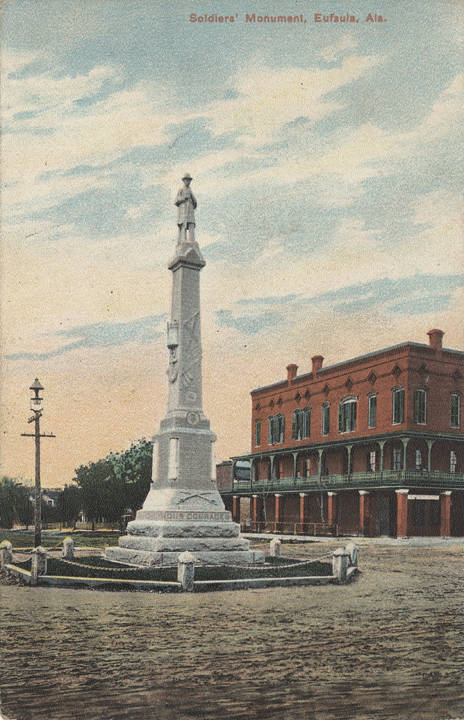By Kevin Fabery
The Confederate Monument in Eufaula, Alabama, was unveiled in 1904 through the efforts of Barbour County’s United Daughters of the Confederacy (UDC) chapter. The UDC, as their organization’s name suggests, were women who were either children during the Civil War or were born after the war to former soldiers of the Confederacy. Since 1866 memory groups such as the UDC worked on rewriting the history of the Civil War through schools and public monuments as a war fought for states’ rights instead of slavery and white supremacy. At the unveiling of the monument, Mary Clayton, the UDC chapter President, declared they sought “to unite with the Confederate Veterans in obtaining an impartial history of the struggle, that the children of our Southland may be taught to reverence the brave men of their own families who laid down their lives in defense of the purest principle of patriotism in 1861-1865.” As she stated, the theme of the Eufaula Confederate monument, as intended by the UDC was to portray the Civil War as the issue of states’ rights instead of white supremacy and slavery. The UDC funded the monument’s construction in order to allow people to see it in a public space and shift the location of memorialization from the cemetery to the city. Their leaders stated at the unveiling that the Civil War was a fight for states’ rights in which Confederate soldiers were brave men who fought with honor rather than maintain slavery and white supremacy.
The monument’s construction coincided with the thirtieth anniversary of an act of white supremacist violence carried out on November 3, 1874, by former Confederates and white residents against black voters in which at least ten men died and over eighty others were wounded; Reconstruction in Alabama ended shortly after this event. A historical marker erected in 1979 on the site of the riot concluded with the sentence, “This bloody episode marked the end of Republican domination in Barbour County,” while ignoring the assault of black voters by white ex-Confederates and residents. Eufaula’s public memory largely ignored this history in favor of foregrounding the city’s Lost Cause Narrative of the Civil War.


